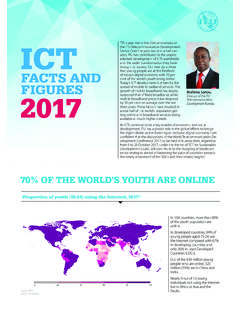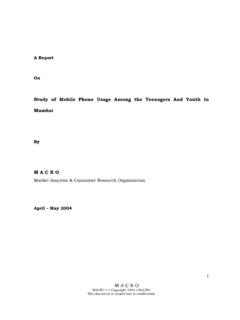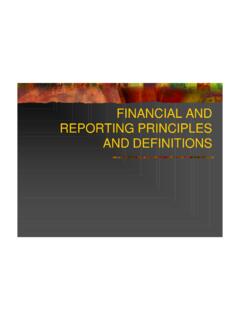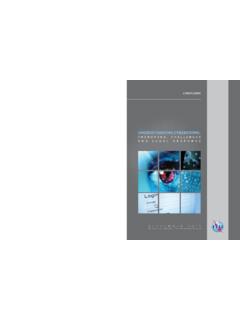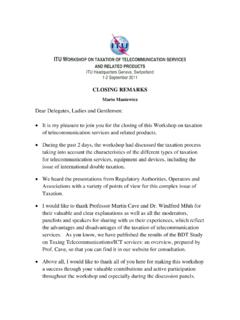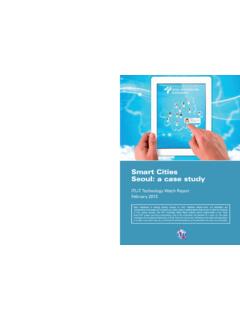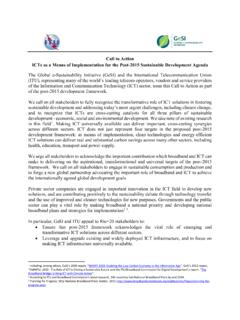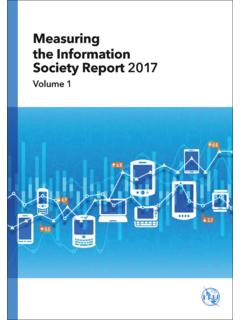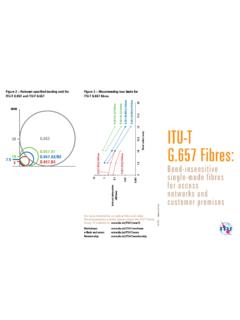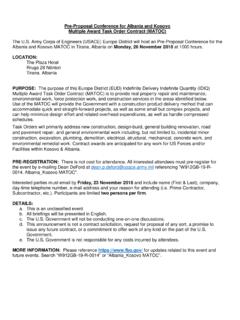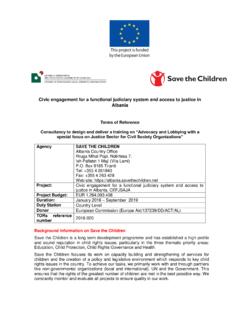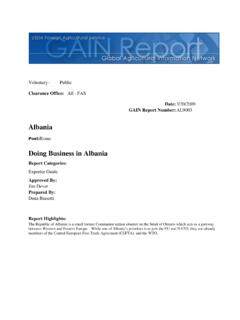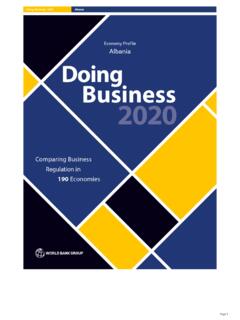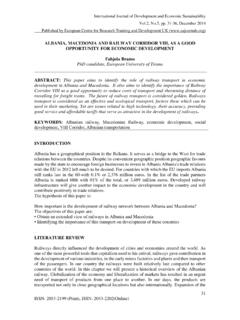Transcription of ICT Centric Innovation Ecosystem Country Review – Albania
1 ICT Centric Innovation Ecosystem Country REVIEWALBANIAINNOVATIONT elecommunication Development SectorPrinted in SwitzerlandGeneva, 2016 International Telecommunication UnionTelecommunication Development BureauPlace des NationsCH-1211 Geneva Centric Innovation Ecosystem Country Review ALBANIAISBN: 978-92-61-20371-99789261203719 ICT Centric Innovation Ecosystem Country Review AlbaniaJune 2016 ITU 2016 All rights reserved. No part of this publication may be reproduced, by any means whatsoever, without the prior written permission of consider the environment before printing this Albania ICT Innovation Ecosystem report was prepared by the Innovation Division within the Telecommunication Development Bureau of ITU; with support from the Department of Trade, Investment and Innovation , Business Environment, Cluster and Innovation Division of United Nations Industrial Development Organization (UNIDO); and the Science, Technology and ICT Branch, Division on Technology and Logistics, United Nations Conference on Trade and Development (UNCTAD).
2 The following outside experts contributed to this report:The UNIDO team included Mr. Anders Isaksson (Senior Industrial Development Officer), Mr. Ritin Koria (Associate Expert Innovation ), Ms. Emi Mima (Associate Expert).Finally, the UNCTAD team included Mr. Angel Gonzalez-Sanz (Chief of Science, Technology and ICT Branch), and Mr. Dimo Calovski (Economist).ITU also appreciates the cooperation and insights from the Ecosystem stakeholders interviewed in Albania , especially from Ms. Elda Sotiri, Ms. Vilma Tomco, Ms. Blerta Xhako, and Ms. Irena Malolli from the Ministry of Innovation and Public Administration, who organized many of our meetings and :978-92-61-20361-0 (paper version) 978-92-61-20371-9 (electronic version)iiiPreface by BDT DirectorInnovation has been given a central place in the work of the International Telecommunication Union (ITU).
3 It was defined as a new priority for the ITU Development Sector (ITU-D) at the World Telecommunication Development Conference in 2014, where ITU-D Membership adopted the Regional Initiatives for Europe, including the one on Entrepreneurship, Innovation and Youth. This initiative aims at fostering the creation of an enabling environment and building capacities at the regional level. The objective is to enhance entrepreneurship and increase Innovation in the ICT Ecosystem , while encouraging empowerment of young men and women and creating new opportunities for them in the ICT sector. Furthermore, ITU Membership adopted Innovation as one of goals at the Plenipotentiary Conference in Busan, the Republic of Korea, in 2014. Innovation has two important roles to play in the development agenda of ITU. On a broad scale, Innovation enables businesses in a Country to create and apply new ICT solutions.
4 This is a major component in facilitating a Country s efforts towards creating a thriving and knowledge-based economy. This in turn ensures that all countries have the opportunity to enjoy the economic and social benefits of ICTs. More specifically, countries will be able to steer ICTs for development solutions, using innovative ICTs to address social and economic problems faced by the world. With this in mind, I am proud and pleased to present this study, the first in a new series of Country reviews with the aim to strengthen the capacity of ITU Members to integrate ICT Innovation in their national development agenda. The ICT Centric Innovation Country Reviews engage key stakeholders fostering Innovation systems at the Country level in order to ensure that a 360 degree Review of the Ecosystem with elaborated guidance reflects the national circumstances and fits the real needs of the ecosystems .
5 I would like to highlight that the Review process in part is a process of building and strengthening a community of stakeholders in the Innovation Ecosystem , coming from the public and private sectors, financial and development agencies, academia, and entrepreneurs themselves that support innovators. It is only by creating a strong community of stakeholders and connecting them with the public sector that we can build strong, organic ICT Innovation ecosystems . Albania is an ideal place to begin the series of Country reviews. It is a Country with great potential. It has undergone a tremendous transformation in the past 20 years, and that transformation is continuing. We hope we can provide new insights to Albania s journey, and that the Telecommunication Development Bureau can become a key partner in cooperating with Albania to bring the benefits of the digital world to all its citizens as well as contribute to achieving the United Nations sustainable development goals (SDGs).
6 Brahima Sanou Director, Telecommunication Development Bureau, ITUF orewordivForeword by Minister of Innovation and Public AdministrationIn Albania , we have seen a rising national awareness and activity about Innovation and large information technology spread over the past few years. In 2014, we developed the cross-cutting strategy Digital Agenda of Albania 2015-2020 to foster the ICT development in Albania . This strategy created a good foundation for the Innovation and information society in Albania , but much more can and must be need to further empower our innovators and entrepreneurs, to make sure that they are competing throughout Europe and around the world. We need to empower them to unlock opportunities in major cities and all rural areas, to ensure that everyone can enjoy the benefits of the growing digital infrastructure in Albania .
7 We need to work with the rising start-up community to further develop this key part of our economy. We asked to our international partners to assess specific opportunities that can help accelerate the transformation of the Albania economy towards a knowledge-based economy. Our international partners, ITU, UNIDO, and UNCTAD realized a critical assessment of the Innovation Ecosystem in Albania . They have worked together with Albanian entrepreneurs, investors, academics, institutions to ensure that the recommendations they set forward will meet the needs of an information society adapted for welcome this report, which will help us empower new entrepreneurs, to make sure that they are creating new services and fostering the growth of our economy. With these recommendations, we hope that we will create the brand of Innovation Made in Albania .
8 We hope that the stakeholders in private sector will lead this transformation, while government will pursue its facilitating and promoting role. I look forward to a future with Albania as a leader in technology in the region and in Europe. I look forward to seeing Albanians become known for their ICT Innovation and me to thank everyone who helped the creation of this report: first of all the dynamic and professional staff of my ministry, the public employees from other ministries for their collaboration, the civil society, private companies, universities and all the stakeholders from the Innovation Ecosystem who offered their time and insights to ensure that the information presented is as accurate as possible and last but not least the teams from the international organizations ITU, UNCTAD, UNIDO who enthusiastically made it Harito Minister of State for Innovation and Public AdministrationvAcknowledgements iiForeword iii1.
9 Executive Summary Introduction and who is targeted The mandate Addressing challenges in Albania Current state Major implications Priority objectives Recommendations Structure of the report Limitations Conclusion 72. Introduction Purpose Current context in Albania Role of technology and Innovation Opportunities in the New Industrial Age ICT Centric economic development: The elusive scenarios Innovation made in Albania 123. Methodology A systems of Innovation primer ICT Centric Innovation Ecosystem Changing requirement of policy Stakeholder groups Ecosystem canvas Process outline Guiding principles 234. Current situation Vision and strategy Infrastructure and programmes Talent and champions Capital and resources Networks and markets Culture Regulation and policy 525.
10 Holistic Review of the Ecosystem Collected analysis Stakeholder interface canvas Overarching themes Good practices from Albania 666. Priority objectives 68 Table of Explanation Public service delivery Fostering success stories Rural Development 717. Recommendations ICT as a strategic sector Ecosystem mapping Collaborative human capacity building Improving the deal flow Internationalization and exits Collaborative clusters Implementation framework 81 Glossary 83 References 88 Appendix A: Systems of Innovation primer 92 Appendix B: Tirana manifesto 94 Appendix C: Institutions surveyed 96viiList of tables, figures and boxesFiguresFigure 1: GDP growth 9 Figure 2: Policy driving Innovation 17 Figure 3: Ecosystem stakeholder groups 18 Figure 4: Innovation : Ecosystem canvas 19 Figure 5: Process flow for Country Review 22 Figure 6: Pillar strength by stakeholders: Vision and strategy 25 Figure 7: Responses from respondents 26 Figure 8: Pillar strengths by stakeholder: infrastructure and programmes 30 Figure 9: Pillar strength by survey question.
